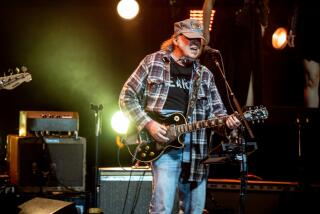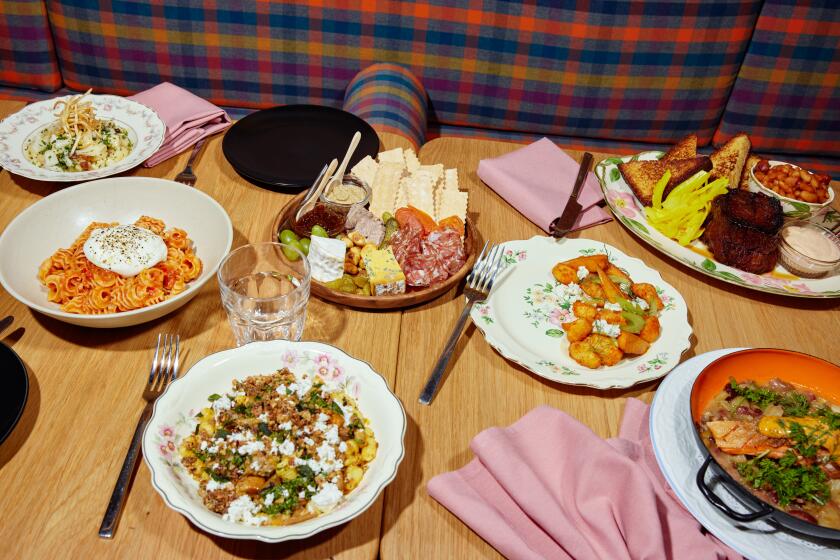Growing Up With Groucho
- Share via
ON JULY 27, 1977, I was appointed my grandfather’s conservator. I was 26 and suddenly in the ironic position of caretaker to a man I had always believed to be invincible--a man who now lay dying. My grandfather was Groucho Marx, and if he were still alive, next Tuesday would be his 100th birthday.
The chef at Trader Vic’s in Beverly Hills is probably relieved he’s not around to celebrate it. My grandfather’s annual birthday dinner at that restaurant always ended the same way, with one of his trademark tirades. “This food is lousy. Take it back and dump it on the chef’s head!” he would order the waiter. I pitied anyone who didn’t know he was a regular customer. Because this was just my grandfather’s way--Groucho was often at his grouchiest (the attitude came before the nickname) when he was showing his appreciation.
Even as a young child, I understood that my grandfather’s gruff behavior was a facade. He was always eager to have his grandson around. He would spend hours asking me about school, earnestly discussing whatever I was studying. But as soon as his guests arrived, he slipped back into his irritable Groucho persona. And they had better arrive on time--if dinner was at 7, that was when Groucho began eating, whether his guests, no matter how important, were there or not.
Although I felt I understood him, I was still awed that this larger-than-life image I saw at the movies could step off the screen and become real. On and off screen, he always had an answer; no one could best him. To me, he was a hero. And unlike today’s action-macho characters who rely on heavy artillery, Grandpa Groucho could get out of any tight spot with just a look and a well-placed one-liner.
Being Groucho’s grandson didn’t mean I had a Hollywood childhood. The only time I tried to take advantage of having a famous grandfather was when I was 11 years old. It was the summer of 1962, and I was away at camp. One afternoon, Robbie Edwards boasted that his ancestors had come to America on the Mayflower.
“Big deal,” I replied. “My grandfather is Groucho Marx.” Robbie didn’t believe me, so I bet him 50 cents. There was just one problem. How was I going to prove it? My prayers were answered several days later when I received an unexpected surprise, a letter from Grandpa Groucho:
Dear Andy,
Your mother tells me you’re having a hot time at camp, and I thought that by this time you might have written me a letter describing your activities. What’s the good of me being your grandfather if you don’t send me any news about yourself?
How long are you going to be up there?
When you get back, be sure to give me a ring. I will invite you over to swim and throw water on the French poodles.
Hoping this reaches you by Pony Express, I still remain your grandfather,
Groucho
Elated, I ran to Robbie’s cabin to collect my winnings. Unfortunately, Robbie had left because someone in his family was ill. So much for milking the family name.
Although I never got my 50 cents, I did spend many days that summer swimming in Groucho’s pool and harassing the dogs (one of which was named De Soto, after the sponsor of “You Bet Your Life”). I had a standing invitation to hang out with my grandfather, and that summer was much like every summer. In the mornings, I’d bum a ride with my mother, Irene (she separated from my father, Groucho’s son Arthur, when I was 10), to Groucho’s house in Beverly Hills. Upon my arrival, Groucho would kiss me on the cheek, his mustache, with its unmistakable scent of cigar, tickling my face.
Groucho had recently completed a 14-year run as the wise-cracking host of NBC’s popular quiz show, “You Bet Your Life.” Now he was 71 and semi-retired, but even when he was working, he found plenty of time to be a grandfather. We swam together and watched cartoons--”Crusader Rabbit” was our favorite. Both avid Dodger fans, we listened to the games on the radio, arguing about whether the team would pull it off that year. And in 1965, we both were on the edge of our seats, cheering for Sandy Koufax the night he pitched his perfect game. Groucho never used a one-liner when he was talking about baseball; baseball was sacred.
When I was an adolescent, Groucho had yet to be turned into a living legend. It had been more than a decade since the Marx Brothers, as a team, had made a film and even longer since they had made one that was considered worth watching. Their early efforts, including 1929’s “The Cocoanuts” and “Animal Crackers” in 1930, had propelled the brothers to stardom. But by the 1950s, their movies, including “Duck Soup” and “A Night at the Opera,” had been all but forgotten, dismissed as mildly funny. (It was a source of much amusement to Groucho when, in the late ‘60s, their films were labeled masterpieces of sophisticated wit.)
He still had time to lunch with his old cronies, especially two of his closest pals--the great wit and pianist Oscar Levant and the songwriter Harry Ruby--at Nate ‘n Al’s delicatessen in Beverly Hills. Often I would tag along. Predictably, my grandfather’s personality shifted when we were around his showbiz friends. He became the combative Groucho--ordering waitresses around, arguing heatedly with Levant--as soon as we walked in the door. But even when I was on the receiving end of one of Groucho’s withering one-liners, I sensed that he was proud to have me there.
To survive these lunches, I developed my skills at verbal combat; occasionally, I scored a few points. One day, I arrived late and Groucho gave me the once-over.
“You’re late,” he growled. “And I’m ashamed to see you.”
“How do you think I feel seeing you ?” I shot back.
As Levant and Ruby chuckled, Groucho relented. “Do you want to join us?” he asked.
“Why?” I replied. “Are you coming apart?” This time I had gone too far.
“Let me give you a piece of advice,” he barked, scowling. “There’s nothing worse than bagging another man’s jokes, especially when that man happens to be your grandfather.”
A few years later, in 1969, when I entered college, the renewed fascination with the Marx Brothers was just beginning to simmer. Their movies were showing up in revival houses, their posters were all over dorms and Groucho-isms were de rigueur.
I, like a great many others of my generation, found myself hooked by their zany irreverence. But I had a head start on the lines and soon developed a much sought-after Groucho imitation. I still saw my grandfather every couple of weeks, and at a family party, I seized the opportunity to impress him by dropping a few of his more famous wisecracks.
“May I buy back my introduction to you?” I asked. He glared at me. I tried another: “You haven’t stopped talking since you got here. You must’ve been vaccinated with a phonograph needle.” Again, I was met with a glower. I decided to ask him about “Duck Soup.” Before I could get a question out, he stopped me.
“Listen,” he snapped, “what makes you think I want to talk about those old movies? I’m not interested in something that I did 30 years ago. When you start talking about things you did in the past, you get old.”
Little did he know that in just a few years, when Marx mania was at its height, he would gladly spend hours reminiscing with Dick Cavett and others. When this transformation occurred, Groucho granted me an interview for my college newspaper.
As he greeted me at his house the day of the interview, I took out my tape recorder. “What’s that for?” he asked.
“I’m recording you,” I said. “I want to get everything right.”
“I don’t let Life magazine record me,” he fired back, angrily. “Why should I let you?”
The passion for the Marx Brothers reached a fever pitch. In 1972, a performance by Groucho at Carnegie Hall sold out the day it was announced. Two years later, he was given a special Academy Award. I watched proudly as my grandfather slowly made his way onstage to the roar of applause. Weakened by several strokes, he paid tribute to his brothers. “I only wish Harpo and Chico could have been here,” he said.
Dinner at Grandpa’s was no longer a simple family affair. It was a celebrity circus: Jack Nicholson, Elliott Gould, Liza Minnelli, Steve Allen, Jack Lemmon, Carroll O’Connor, Bill Cosby and Alice Cooper were just a few who would drop in. Groucho had become an idol the second time around.
As for me, I was thrilled to meet some of these stars, but I also wished I had more time alone with my grandfather. And when he was 84, I’m not sure he really knew who a lot of these new-found admirers were; he probably couldn’t tell Liza Minnelli from Alice Cooper.
No evening was complete until he got the chance to regale his guests with several spirited choruses of “Hello, I Must Be Going” and “Hooray for Captain Spaulding” from “Animal Crackers.” Although he seemed to enjoy himself, these predictable performances began to remind me of a talented kid being trotted out to play the violin for his parents’ guests.
As Groucho’s health declined, these parties became more and more infrequent. In 1977, he was in and out of Cedars-Sinai. In late June, he entered the hospital for the last time.
I visited him often and was heartened one day by his insistence that we watch baseball’s All-Star game on TV together that July. Sitting on the edge of his bed, I longed for the afternoons we had spent together listening to Dodger games. It was one of the last peaceful afternoons I spent with him.
While Groucho battled for his life, a battle of a different sort raged in a Santa Monica courtroom. For the previous five years, to my father’s consternation, Groucho had been keeping company with Erin Fleming, who had great influence over him. Fleming and my father were now fighting over who would be Groucho’s conservator. Because of the vested interests of both sides, the judge chose a neutral party--me. I was to run Groucho’s household, confer with the doctors and make whatever decisions there were to make. The man whom I had admired all my life was suddenly in my care.
Three weeks later, Groucho took a turn for the worse. His doctor informed me on the morning of Aug. 19 that my grandfather would probably not live through the day. I spent the next several hours with my father and stepmother, watching Groucho slip in and out of consciousness. As with any appearance by Groucho Marx, the scene was not without humor. As my grandfather teetered on the edge of death, Elliott Gould, in tennis whites and carrying a racket, breezed in as though he was expecting to get in a fast game with Groucho. Shocked at Groucho’s appearance, he sheepishly excused himself.
Later, as the sun set, Groucho’s condition worsened. At 7:25 p.m., my grandfather was gone. I watched my father kiss him on the forehead, and I did the same. I took one last look at Grandpa Groucho, the man who almost won me 50 cents in the summer of 1962.
In the following days, I was constantly asked how Groucho died. “Too many birthdays,” I would reply, pilfering yet another joke from the master.
More to Read
Eat your way across L.A.
Get our weekly Tasting Notes newsletter for reviews, news and more.
You may occasionally receive promotional content from the Los Angeles Times.










